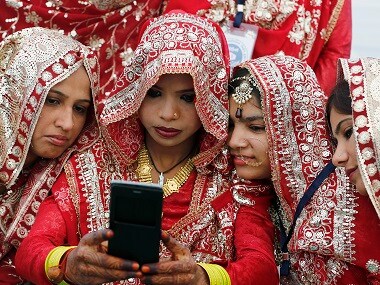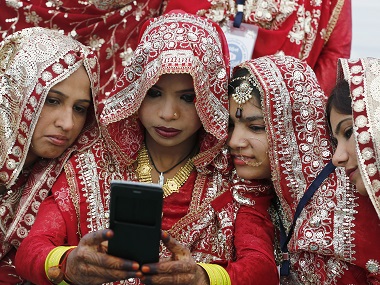A Centre-appointed committee, set up to review aspects of personal laws relating to marriage, divorce and custody prevalent in religious minorities, including Muslims, has called for a ban on the practice of verbal, unilateral, triple talaq and polygamy,
as reported by The Indian Express
. [caption id=“attachment_2649306” align=“alignleft” width=“380”] Representational image. Reuters[/caption] The Supreme Court had directed the Centre on 28 March to submit the report in six weeks while hearing a plea filed by Shayara Bano from Uttarakhand. Bano, who is from Kashipur in Uttarakhand, was divorced by triple talaq in 2015. She had filed a writ petition this year challenging the constitutionality of Muslim practices of polygamy, triple talaq (talaq-e-bidat) and nikah halala. The committee stated that talaq makes “wives extremely vulnerable and insecure regarding their marital status,” the report further said. It also suggested amendments to the Dissolution of Muslim Marriages Act 1939, the report added. A bench comprising Chief justice TS Thakur and Justice UU Lalit also asked the Ministry of Minority Affairs to file its response to the petition filed by Bano. She has stated in her petition that her family was compelled to pay dowry and her husband and his family subjected her to cruelty and administered drugs to her that “caused her memory to fade and kept her unconscious” which made her critically ill. She said that her husband divorced Bano by triple talaq. The petition further states that the practice of triple talaq is not “harmonious with the modern principles of human rights and gender equality and is not a part of the Islamic faith.” It further stated that countries like Saudi Arabia, Pakistan and Iraq have banned or restricted this practice. “The practice of talaq-e-bidat and divorce of a woman without proper attempt at reconciliation violates the basic right to live with dignity of every Muslim woman,” said Bano said in her petition. Here is the full petition:
Representational image. Reuters[/caption] The Supreme Court had directed the Centre on 28 March to submit the report in six weeks while hearing a plea filed by Shayara Bano from Uttarakhand. Bano, who is from Kashipur in Uttarakhand, was divorced by triple talaq in 2015. She had filed a writ petition this year challenging the constitutionality of Muslim practices of polygamy, triple talaq (talaq-e-bidat) and nikah halala. The committee stated that talaq makes “wives extremely vulnerable and insecure regarding their marital status,” the report further said. It also suggested amendments to the Dissolution of Muslim Marriages Act 1939, the report added. A bench comprising Chief justice TS Thakur and Justice UU Lalit also asked the Ministry of Minority Affairs to file its response to the petition filed by Bano. She has stated in her petition that her family was compelled to pay dowry and her husband and his family subjected her to cruelty and administered drugs to her that “caused her memory to fade and kept her unconscious” which made her critically ill. She said that her husband divorced Bano by triple talaq. The petition further states that the practice of triple talaq is not “harmonious with the modern principles of human rights and gender equality and is not a part of the Islamic faith.” It further stated that countries like Saudi Arabia, Pakistan and Iraq have banned or restricted this practice. “The practice of talaq-e-bidat and divorce of a woman without proper attempt at reconciliation violates the basic right to live with dignity of every Muslim woman,” said Bano said in her petition. Here is the full petition:
According to Live Law , the All India Muslim Personal Law Board has filed an Interlocutory Application stating that the Muslim Personal Law is a cultural issue and questioning the validity of marriage, divorce and maintenance under the law is out of question. The group had stated that the rights of the Muslim women are protected under Muslim Women (Protection of Rights on Divorce) Act, 1986, the report said. Kamal Faruqui, a member of the All India Muslim Personal Law Board was quoted by The Indian Express saying that they will not be accepting the ban on triple talaq or polygamy. “This will mean direct interference of the government in religious affairs as Sharia (Islamic law) is based on the Quran and Hadith,” he was quoted in the report. According to the report, the panel was formed in February 2012 under the UPA government and it was reconstituted again in 2013. Activists have been campaigning for a change in the Muslim personal law as it allows polygamy and the use of the triple talaq system. With inputs from PTI
)